Unit 5 Our neighbourhood Lesson 1 My neighbourhood课件(共38页PPT)初中英语冀教版(2024)七年级下册
文档属性
| 名称 | Unit 5 Our neighbourhood Lesson 1 My neighbourhood课件(共38页PPT)初中英语冀教版(2024)七年级下册 | 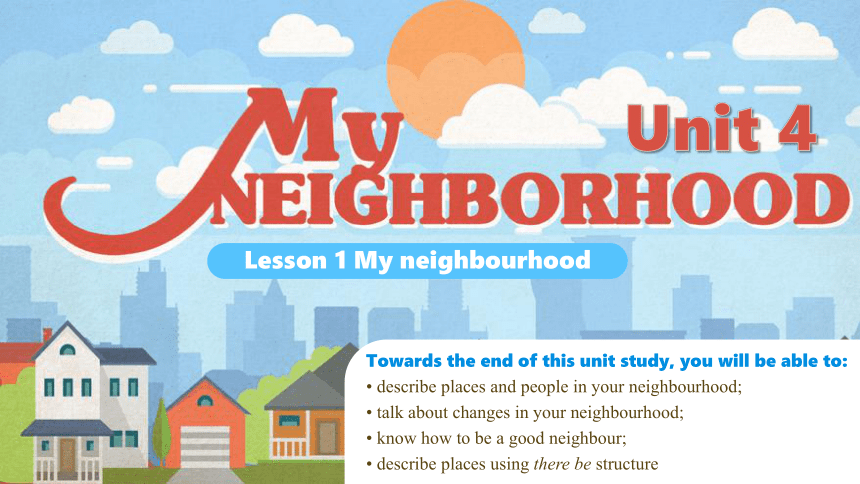 | |
| 格式 | pptx | ||
| 文件大小 | 18.8MB | ||
| 资源类型 | 教案 | ||
| 版本资源 | 冀教版 | ||
| 科目 | 英语 | ||
| 更新时间 | 2025-04-18 21:10:07 | ||
图片预览




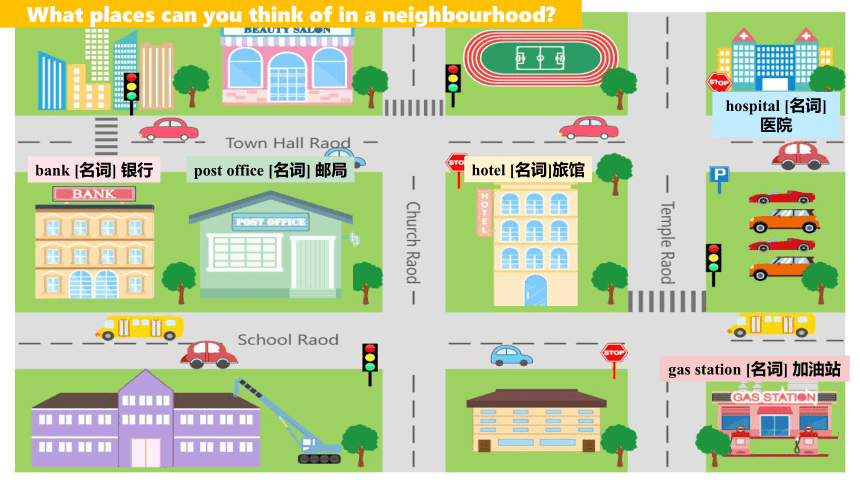
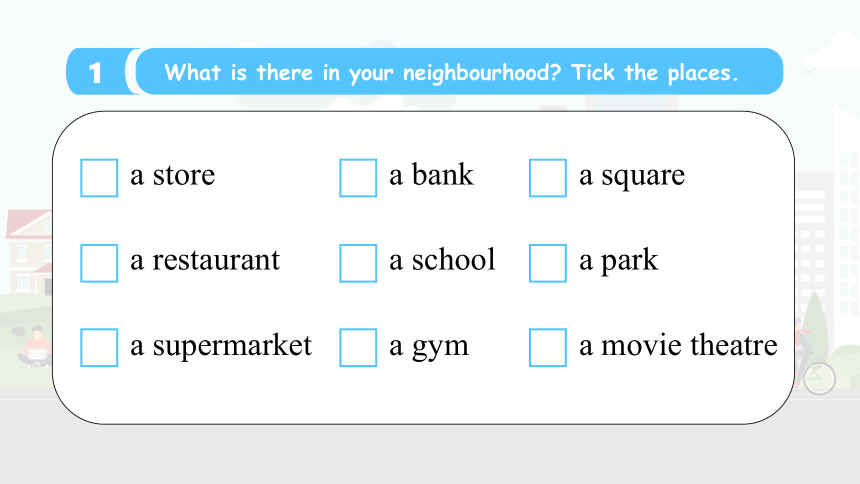


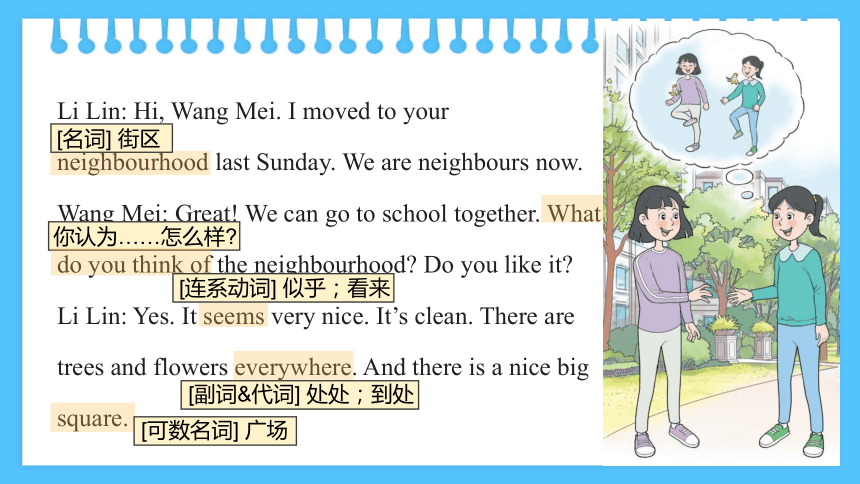

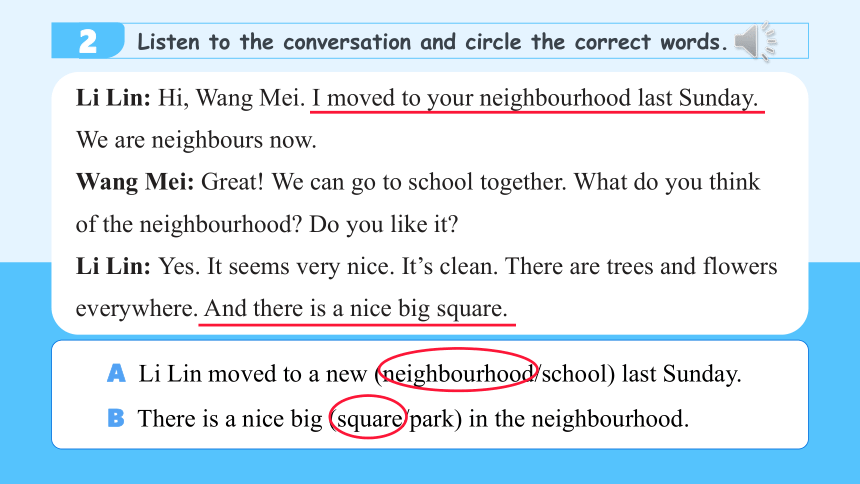
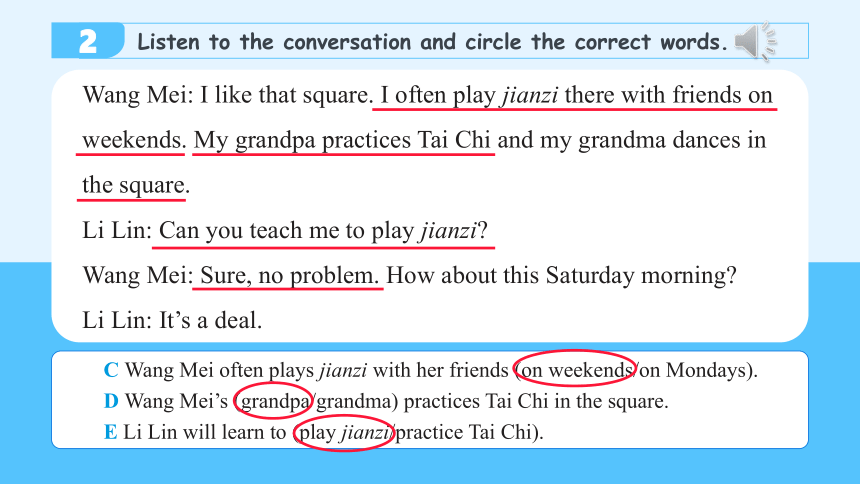
文档简介
(共36张PPT)
Unit 4
Lesson 1 My neighbourhood
Towards the end of this unit study, you will be able to:
describe places and people in your neighbourhood;
talk about changes in your neighbourhood;
know how to be a good neighbour;
describe places using there be structure
01
02
03
04
教学目标
学生能够掌握与社区设施、位置描述相关的重点词汇和短语,学会使用描述社区设施位置的常用句型,在实际情境中灵活运用。
全面提升学生的英语语言技能,使其能够听懂关于社区设施及位置的介绍,精准获取关键信息,如设施名称、所在位置等。
激发学生对自己生活社区的热爱和关注,培养学生的社区归属感和责任感,让学生意识到社区是大家共同生活的地方,需要共同维护和建设。
通过课堂活动,锻炼学生的自主学习能力和合作探究能力,让学生学会自主查阅资料、思考问题,共同完成学习任务,提升学生的综合学习能力。
教学重难点
01
02
掌握与社区设施、位置描述相关的重点词汇、短语以及常用句型,确保学生能够熟练运用这些知识进行交流表达。
鼓励学生在口语表达中灵活运用句型,根据不同社区布局自然、恰当地描述设施位置,克服表达时的生硬和不流畅,提高口语表达的流利度和准确性,使交流更加顺畅、真实。
Warming upLESSON101What places can you think of in a neighbourhood
bank [名词] 银行
post office [名词] 邮局
hotel [名词]旅馆
gas station [名词] 加油站
hospital [名词]医院
1
What is there in your neighbourhood Tick the places.
a store
a restaurant
a supermarket
a bank
a school
a gym
a square
a park
a movie theatre
Li Lin moved to new neighbourhood. She met her classmate Wang Mei.
Let's listen to their conversation.
I'm surprised to see you here, Li Lin.
Hi, Wang Mei. I moved to your neighbourhood last Sunday…
ListeningLESSON102Li Lin: Hi, Wang Mei. I moved to your neighbourhood last Sunday. We are neighbours now.
Wang Mei: Great! We can go to school together. What do you think of the neighbourhood Do you like it
Li Lin: Yes. It seems very nice. It’s clean. There are trees and flowers everywhere. And there is a nice big square.
[名词] 街区
你认为……怎么样
[连系动词] 似乎;看来
[副词&代词] 处处;到处
[可数名词] 广场
Wang Mei: I like that square. I often play jianzi there with friends on weekends. My grandpa practices Tai Chi and my grandma dances in the square.
Li Lin: Can you teach me to play jianzi
Wang Mei: Sure, no problem. How about this Saturday morning
Li Lin: It’s a deal.
没问题;小事一桩
说定了。/一言为定。
[动词] 练习;实习
2
Listen to the conversation and circle the correct words.
A Li Lin moved to a new (neighbourhood/school) last Sunday.
B There is a nice big (square/park) in the neighbourhood.
Li Lin: Hi, Wang Mei. I moved to your neighbourhood last Sunday. We are neighbours now.
Wang Mei: Great! We can go to school together. What do you think of the neighbourhood Do you like it
Li Lin: Yes. It seems very nice. It’s clean. There are trees and flowers everywhere. And there is a nice big square.
2
Listen to the conversation and circle the correct words.
C Wang Mei often plays jianzi with her friends (on weekends/on Mondays).
D Wang Mei’s (grandpa/grandma) practices Tai Chi in the square.
E Li Lin will learn to (play jianzi/practice Tai Chi).
Wang Mei: I like that square. I often play jianzi there with friends on weekends. My grandpa practices Tai Chi and my grandma dances in the square.
Li Lin: Can you teach me to play jianzi
Wang Mei: Sure, no problem. How about this Saturday morning
Li Lin: It’s a deal.
3
Listen to the conversation again and answer the questions.
Wang Mei: I like that square. I often play jianzi there with friends on weekends. My grandpa practices Tai Chi and my grandma dances in the square.
Li Lin: Can you teach me to play jianzi
Wang Mei: Sure, no problem. How about this Saturday morning
Li Lin: It’s a deal.
A What does Wang Mei’s grandma do in the square
Her grandma dances in the square.
3
Listen to the conversation again and answer the questions.
Wang Mei: I like that square. I often play jianzi there with friends on weekends. My grandpa practices Tai Chi and my grandma dances in the square.
Li Lin: Can you teach me to play jianzi
Wang Mei: Sure, no problem. How about this Saturday morning
Li Lin: It’s a deal.
B When will Wang Mei and Li Lin play jianzi in the square
This Saturday morning.
4
Listen to the dialogue and write true (T) or false (F).
A Jack moved to this new neighbourhood last weekend. ( )
B There is a nice gym in Jack’s neighbourhood. ( )
C They will play basketball this weekend. ( )
a big square
5
Work in groups. Describe your neighbourhood.
What do you think of your neighbourhood
It’s new/nice/...
There is a square/
supermarket/... in my neighbourhood.
5
Work in groups. Describe your neighbourhood.
What do you like to do in your neighbourhood
I like to play sports/ talk to my neighbours/...
Listen and repeat. Write more words in each group.
ow /a / now how _______________________
ee /i:/ tree weekend _______________________
eigh /e / neighbour weigh _______________________
ere /e / there everywhere _______________________
ds /dz/ friends weekends _______________________
brown cow bow
meet keep sheep
eight eighty height
where anywhere here
bands words seeds
英语名词复数变化及发音规则
1、一般在词尾加-s.
一般来说,s在元音或浊辅音后读[z],在清辅音后面读成[s],在[t]后与[t]在一起读成[ts],在[d]后与[d]一起读成[dz]。
cups [ k ps] 杯子 days [ de z] 日子
hands [ h ndz] 手
2、以s, sh, ch, x结尾的词在词尾加-es,读[iz]。
classes [ kl s z] 班级
4、以o结尾的词,多数加-s,读[z]。
以元音字母+o结尾的词一律加-s,读[z]。
英语名词复数变化及发音规则
3、以“元音字母+y”结尾的词,加-s,读作[z];以辅音字母+y结尾的词,变y为i,再加-es,读[iz]。
boy → boys [b z] army → armies [ ɑ:miz]
photo → photos [ fo to z]
photo → photos [ fo to z]
少数以o结尾的词,在词尾加-es,读[z]。
tomato → tomatoes [ fo to z]
5、以f或fe结尾的词,多数把f,fe变为v,再加-es,读[vz]。
leaf → leaves [livz] knife → knives [na vz]
LanguagePoints03LESSON1
1
I moved to your neighbourhood last Sunday.
neighbourhood [名词] 街区;城区;邻近的地方
in one’s neighbourhood 在某人的街区
in the neighbourhood 在附近 (=near here)
in the neighbourhood of 在……的附近
They are in the same neighbourhood. 他们在同一个街区。
We live in the neighbourhood of the park. 我们住在公园附近。
2
What do you think of the neighbourhood
What do you think of... 你认为……怎么样
相当于“How do you like... ”或“How do you feel about... ”,常用来询问对方对某事物的观点或看法。
What do you think of the fashion show
你认为这场时装表演怎么样
= How do you like the fashion show
= How do you feel about the fashion show
2
What do you think of the neighbourhood
think of 认为 相当于 think about。
of是介词,其后可接名词、代词或v. -ing形式作宾语。
---What do you think of/about the school trip
你认为这次学校旅行怎么样
---It's great. 非常好。
think of 想象
I never see him. I can't think of what he looks like.
我从没见过他,我想象不出他的样子。
think of 考虑;想起
What are you thinking of 你在想些什么
3
It seems very nice.
seem [连系动词] 似乎;看来;好像
seem(+to be)+名词/形容词 看起来 /好像……
说明主语的特征或状态,to be 可省略。
She seems happy today. 她今天看起来很开心。
seem to do sth. 好像/似乎做某事
Danny seems to know everything. 丹尼好像什么都知道。
It seems/seemed that... 好像/似乎......
It seems as if... 看起来像/仿佛……
4
There are trees and flowers everywhere.
everywhere [副词&代词] 处处;到处;所有地方
相当于 here and there。
everywhere前不能使用介词,如in, at, to 等。
Gina's books are everywhere—on her bed, on the sofa and under the chair.
吉娜的书到处都是——她的床上、沙发上、椅子底下(都有)。
Everywhere is crowded during the holiday.
假期里到处都很拥挤。
(副词)
(代词)
5
And there is a nice big square.
square [可数名词] 广场;四方形;平方
in the square 在广场
Tian'anmen Square 天安门广场
draw a square 画一个四方形
The square of 7 is 49. 7的平方是49。
square [形容词] 四方形的
a large square room 一个四方形的大房间
6
Sure, no problem.
no problem 没问题;小事一桩
常用于口语中,表示同意或愉快地接受别人的请求
---Could you post the letter for me
你能帮我寄这封信吗
---No problem. 没问题。
no problem 不用谢;别客气;没什么
用来回答感谢,相当于you're welcome成 not at all。
7
It's a deal.
It’s a deal. 说定了。/一言为定。/就这么办。
常用于口语中。
---Let's meet at half past six. 咱们6点半见面吧。
---It's a deal. 就这么定了。
deal [名词] 协议;(尤指)交易;大量
make/do a deal (with...) (与……) 达成协议
They made/did a deal with the company.
他们与这家公司达成了协议。
a great/good deal of+不可数名词
Exercise04LESSON1根据句意及首字母提示补全单词
1. There are beautiful flowers e in the park.
2. Our n is very quiet and clean. I like living there.
3. Let's make a d to help each other with study on weekends.
4. There is a big s near my home. My grandmother likes dancing here.
5. It s that it is going to rain.
verywhere
eighbourhood
eal
quare
eems
根据句意填入适当的单词
1. I often play chess my grandfather in the evening.
2. The shop closes at 7:30 p. m. weekends.
3. Many people dance in square every day.
4. —Lucy, how going to the library
—Sounds great!
with
on
the
about
根据汉语意思完成句子
1. 课后老师教我们打篮球。
The teacher us basketball after class.
2. 看起来他今天非常开心。
It he is very happy today.
3. 我们上个月搬到了新家。
We a new house last month.
4. 我经常在周末去公园放松。
I often go to the park to relax.
5. 你觉得你的新学校怎么样?
do you your new school
teaches
to play
seems that
moved to
on weekends
What
think of
Homework05LESSON1
Homework
Must-do:
Describe your neighbourhood to your family, using the words and sentence patterns you've learned. The description should last for at least one minute. Ask your family to evaluate your description and record their feedback.
SEE YOU NEXT TIME
Unit 4
Lesson 1 My neighbourhood
Towards the end of this unit study, you will be able to:
describe places and people in your neighbourhood;
talk about changes in your neighbourhood;
know how to be a good neighbour;
describe places using there be structure
01
02
03
04
教学目标
学生能够掌握与社区设施、位置描述相关的重点词汇和短语,学会使用描述社区设施位置的常用句型,在实际情境中灵活运用。
全面提升学生的英语语言技能,使其能够听懂关于社区设施及位置的介绍,精准获取关键信息,如设施名称、所在位置等。
激发学生对自己生活社区的热爱和关注,培养学生的社区归属感和责任感,让学生意识到社区是大家共同生活的地方,需要共同维护和建设。
通过课堂活动,锻炼学生的自主学习能力和合作探究能力,让学生学会自主查阅资料、思考问题,共同完成学习任务,提升学生的综合学习能力。
教学重难点
01
02
掌握与社区设施、位置描述相关的重点词汇、短语以及常用句型,确保学生能够熟练运用这些知识进行交流表达。
鼓励学生在口语表达中灵活运用句型,根据不同社区布局自然、恰当地描述设施位置,克服表达时的生硬和不流畅,提高口语表达的流利度和准确性,使交流更加顺畅、真实。
Warming upLESSON101What places can you think of in a neighbourhood
bank [名词] 银行
post office [名词] 邮局
hotel [名词]旅馆
gas station [名词] 加油站
hospital [名词]医院
1
What is there in your neighbourhood Tick the places.
a store
a restaurant
a supermarket
a bank
a school
a gym
a square
a park
a movie theatre
Li Lin moved to new neighbourhood. She met her classmate Wang Mei.
Let's listen to their conversation.
I'm surprised to see you here, Li Lin.
Hi, Wang Mei. I moved to your neighbourhood last Sunday…
ListeningLESSON102Li Lin: Hi, Wang Mei. I moved to your neighbourhood last Sunday. We are neighbours now.
Wang Mei: Great! We can go to school together. What do you think of the neighbourhood Do you like it
Li Lin: Yes. It seems very nice. It’s clean. There are trees and flowers everywhere. And there is a nice big square.
[名词] 街区
你认为……怎么样
[连系动词] 似乎;看来
[副词&代词] 处处;到处
[可数名词] 广场
Wang Mei: I like that square. I often play jianzi there with friends on weekends. My grandpa practices Tai Chi and my grandma dances in the square.
Li Lin: Can you teach me to play jianzi
Wang Mei: Sure, no problem. How about this Saturday morning
Li Lin: It’s a deal.
没问题;小事一桩
说定了。/一言为定。
[动词] 练习;实习
2
Listen to the conversation and circle the correct words.
A Li Lin moved to a new (neighbourhood/school) last Sunday.
B There is a nice big (square/park) in the neighbourhood.
Li Lin: Hi, Wang Mei. I moved to your neighbourhood last Sunday. We are neighbours now.
Wang Mei: Great! We can go to school together. What do you think of the neighbourhood Do you like it
Li Lin: Yes. It seems very nice. It’s clean. There are trees and flowers everywhere. And there is a nice big square.
2
Listen to the conversation and circle the correct words.
C Wang Mei often plays jianzi with her friends (on weekends/on Mondays).
D Wang Mei’s (grandpa/grandma) practices Tai Chi in the square.
E Li Lin will learn to (play jianzi/practice Tai Chi).
Wang Mei: I like that square. I often play jianzi there with friends on weekends. My grandpa practices Tai Chi and my grandma dances in the square.
Li Lin: Can you teach me to play jianzi
Wang Mei: Sure, no problem. How about this Saturday morning
Li Lin: It’s a deal.
3
Listen to the conversation again and answer the questions.
Wang Mei: I like that square. I often play jianzi there with friends on weekends. My grandpa practices Tai Chi and my grandma dances in the square.
Li Lin: Can you teach me to play jianzi
Wang Mei: Sure, no problem. How about this Saturday morning
Li Lin: It’s a deal.
A What does Wang Mei’s grandma do in the square
Her grandma dances in the square.
3
Listen to the conversation again and answer the questions.
Wang Mei: I like that square. I often play jianzi there with friends on weekends. My grandpa practices Tai Chi and my grandma dances in the square.
Li Lin: Can you teach me to play jianzi
Wang Mei: Sure, no problem. How about this Saturday morning
Li Lin: It’s a deal.
B When will Wang Mei and Li Lin play jianzi in the square
This Saturday morning.
4
Listen to the dialogue and write true (T) or false (F).
A Jack moved to this new neighbourhood last weekend. ( )
B There is a nice gym in Jack’s neighbourhood. ( )
C They will play basketball this weekend. ( )
a big square
5
Work in groups. Describe your neighbourhood.
What do you think of your neighbourhood
It’s new/nice/...
There is a square/
supermarket/... in my neighbourhood.
5
Work in groups. Describe your neighbourhood.
What do you like to do in your neighbourhood
I like to play sports/ talk to my neighbours/...
Listen and repeat. Write more words in each group.
ow /a / now how _______________________
ee /i:/ tree weekend _______________________
eigh /e / neighbour weigh _______________________
ere /e / there everywhere _______________________
ds /dz/ friends weekends _______________________
brown cow bow
meet keep sheep
eight eighty height
where anywhere here
bands words seeds
英语名词复数变化及发音规则
1、一般在词尾加-s.
一般来说,s在元音或浊辅音后读[z],在清辅音后面读成[s],在[t]后与[t]在一起读成[ts],在[d]后与[d]一起读成[dz]。
cups [ k ps] 杯子 days [ de z] 日子
hands [ h ndz] 手
2、以s, sh, ch, x结尾的词在词尾加-es,读[iz]。
classes [ kl s z] 班级
4、以o结尾的词,多数加-s,读[z]。
以元音字母+o结尾的词一律加-s,读[z]。
英语名词复数变化及发音规则
3、以“元音字母+y”结尾的词,加-s,读作[z];以辅音字母+y结尾的词,变y为i,再加-es,读[iz]。
boy → boys [b z] army → armies [ ɑ:miz]
photo → photos [ fo to z]
photo → photos [ fo to z]
少数以o结尾的词,在词尾加-es,读[z]。
tomato → tomatoes [ fo to z]
5、以f或fe结尾的词,多数把f,fe变为v,再加-es,读[vz]。
leaf → leaves [livz] knife → knives [na vz]
LanguagePoints03LESSON1
1
I moved to your neighbourhood last Sunday.
neighbourhood [名词] 街区;城区;邻近的地方
in one’s neighbourhood 在某人的街区
in the neighbourhood 在附近 (=near here)
in the neighbourhood of 在……的附近
They are in the same neighbourhood. 他们在同一个街区。
We live in the neighbourhood of the park. 我们住在公园附近。
2
What do you think of the neighbourhood
What do you think of... 你认为……怎么样
相当于“How do you like... ”或“How do you feel about... ”,常用来询问对方对某事物的观点或看法。
What do you think of the fashion show
你认为这场时装表演怎么样
= How do you like the fashion show
= How do you feel about the fashion show
2
What do you think of the neighbourhood
think of 认为 相当于 think about。
of是介词,其后可接名词、代词或v. -ing形式作宾语。
---What do you think of/about the school trip
你认为这次学校旅行怎么样
---It's great. 非常好。
think of 想象
I never see him. I can't think of what he looks like.
我从没见过他,我想象不出他的样子。
think of 考虑;想起
What are you thinking of 你在想些什么
3
It seems very nice.
seem [连系动词] 似乎;看来;好像
seem(+to be)+名词/形容词 看起来 /好像……
说明主语的特征或状态,to be 可省略。
She seems happy today. 她今天看起来很开心。
seem to do sth. 好像/似乎做某事
Danny seems to know everything. 丹尼好像什么都知道。
It seems/seemed that... 好像/似乎......
It seems as if... 看起来像/仿佛……
4
There are trees and flowers everywhere.
everywhere [副词&代词] 处处;到处;所有地方
相当于 here and there。
everywhere前不能使用介词,如in, at, to 等。
Gina's books are everywhere—on her bed, on the sofa and under the chair.
吉娜的书到处都是——她的床上、沙发上、椅子底下(都有)。
Everywhere is crowded during the holiday.
假期里到处都很拥挤。
(副词)
(代词)
5
And there is a nice big square.
square [可数名词] 广场;四方形;平方
in the square 在广场
Tian'anmen Square 天安门广场
draw a square 画一个四方形
The square of 7 is 49. 7的平方是49。
square [形容词] 四方形的
a large square room 一个四方形的大房间
6
Sure, no problem.
no problem 没问题;小事一桩
常用于口语中,表示同意或愉快地接受别人的请求
---Could you post the letter for me
你能帮我寄这封信吗
---No problem. 没问题。
no problem 不用谢;别客气;没什么
用来回答感谢,相当于you're welcome成 not at all。
7
It's a deal.
It’s a deal. 说定了。/一言为定。/就这么办。
常用于口语中。
---Let's meet at half past six. 咱们6点半见面吧。
---It's a deal. 就这么定了。
deal [名词] 协议;(尤指)交易;大量
make/do a deal (with...) (与……) 达成协议
They made/did a deal with the company.
他们与这家公司达成了协议。
a great/good deal of+不可数名词
Exercise04LESSON1根据句意及首字母提示补全单词
1. There are beautiful flowers e in the park.
2. Our n is very quiet and clean. I like living there.
3. Let's make a d to help each other with study on weekends.
4. There is a big s near my home. My grandmother likes dancing here.
5. It s that it is going to rain.
verywhere
eighbourhood
eal
quare
eems
根据句意填入适当的单词
1. I often play chess my grandfather in the evening.
2. The shop closes at 7:30 p. m. weekends.
3. Many people dance in square every day.
4. —Lucy, how going to the library
—Sounds great!
with
on
the
about
根据汉语意思完成句子
1. 课后老师教我们打篮球。
The teacher us basketball after class.
2. 看起来他今天非常开心。
It he is very happy today.
3. 我们上个月搬到了新家。
We a new house last month.
4. 我经常在周末去公园放松。
I often go to the park to relax.
5. 你觉得你的新学校怎么样?
do you your new school
teaches
to play
seems that
moved to
on weekends
What
think of
Homework05LESSON1
Homework
Must-do:
Describe your neighbourhood to your family, using the words and sentence patterns you've learned. The description should last for at least one minute. Ask your family to evaluate your description and record their feedback.
SEE YOU NEXT TIME
同课章节目录
